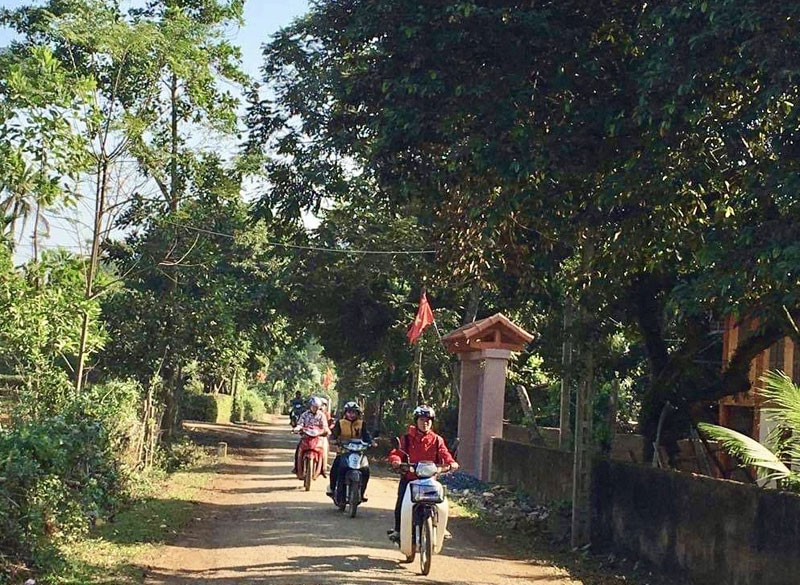
(HBO) – Van Son commune of Lac Son district, Hoa Binh province, has since 2017 been among the beneficiaries of Programme 135 which targets particularly disadvantaged communes nationwide. Thanks to priority given to the paving of roads linking communes and hamlets and those traversing farmland, transport infrastructure has been improved considerably, thereby creating a turning point in local socio-economic development.
 Roads connecting villages in Van Son commune of Lac Son
district have been paved, thus facilitating travel and goods transport.
Roads connecting villages in Van Son commune of Lac Son
district have been paved, thus facilitating travel and goods transport.
Vice Chairman of the Van Son communal People’s
Committee Bui Van Nen said thanks to assistance from the programme, transport
infrastructure has gained a facelift and some irrigation facilities built to
help with agricultural development.
Local roads have had about 70 percent of their
total length concreted over, including those from the Van Son Primary and
Senior High School to Roc Khum village, from the commune’s centre to Tre
village of Thuong Coc commune, from Roc Khum village to Khang Trao village, and
from the communal People’s Committee office to Bung village of Nhan Nghia
commune. Another road from Khang Trao village to Ray village is set to be
upgraded this year, the official noted.
In the past, unfavourable road conditions
hampered socio-economic development in Van Son commune for a long period of
time. Thanks to Programme 135, this rural area has undergone substantial
improvement, thereby facilitating goods transport, house construction and
repair, as well as the ensuring of political security and social order and
safety.
Per capita income increased from 17 million VND
(over 730 USD at the current exchange rate) in 2017 to 24 million VND in 2019,
and it is expected to reach 28 million VND this year./.
Hoa Binh province is undergoing a dynamic transformation amid Vietnam’s national digital transition. Building on Poliburo’s Resolution No. 57-NQ/TW on breakthroughs in science, technology, innovation, and national digital transformation, the province has rolled out a wide range of practical action plans. A standout initiative is the "Digital Literacy for All” movement, an effort to ensure that no one is left behind in the digital era.
Hoa Binh province is undergoing a dynamic transformation in the wake of the national digital transformation movement. Building on Resolution No. 57-NQ/TW of the Politburo on breakthroughs in science, technology, innovation, and national digital transformation, the province has implemented a wide range of practical action plans. A standout initiative is the "Digital Literacy for All” movement ambitious effort to ensure that no one is left behind in the digital age.
With a spirit of unity and proactive problem-solving, the Party Committee, the government and the people of Dong Lai Commune (Tan Lac District) have made great strides in implementing the resolutions of the 24th Party Congress of the commune for the 2020 - 2025 term. Focusing on leadership and practical actions, the commune has brought the Party’s resolutions into daily life, creating strong impacts and pushing the local development forward.
Amid the nationwide push for digital transformation, young people in Hoa Binh Province are stepping up as dynamic pioneers, applying technology to enhance Youth Union operations and expand the reach of youth-led initiatives. Through creativity and adaptability, Youth Union organizations at all levels have introduced a series of practical solutions, contributing to modern governance and community development.
In recent years, An Nghia commune, located in Lac Son district, has stepped up administrative reform, focusing on improving the quality and efficiency of its single-window service unit for receiving and processing administrative procedures. These improvements have helped create favourable conditions for local residents and organisations to handle administrative procedures, contributing to the commune’s broader socio-economic development.
The Prime Minister-approved master plan to develop the multi-use value of forests ecosystems through 2030, with a vision to 2050, aims to improve the management and sustainable use of forest resources, create jobs, increase incomes, and improve the living standards of ethnic minorities, people in mountainous and remote areas, forest workers and those living near forests.



 Roads connecting villages in Van Son commune of Lac Son
district have been paved, thus facilitating travel and goods transport.
Roads connecting villages in Van Son commune of Lac Son
district have been paved, thus facilitating travel and goods transport.